Mental Health Awareness Through the Literary Arts
Cristiana Baik is the director of Development at Richmond Area Multi-Services, Inc., a community-based mental health agency in San Francisco. She is committed to her work and in helping to create healthier communities and a more equitable society. Baik received a BA in Gender Studies/Cultural Anthropology from the University of Chicago, and an MFA in Creative Writing from the University of Alabama-Tuscaloosa. Her poems and reviews have been published in various journals, including the Boston Review, American Letters & Commentary, Drunken Boat, and Conjunctions. Her chapbook, The Stars Went Out and So Did the Moon, was published by Finishing Line Press in the fall of 2017.
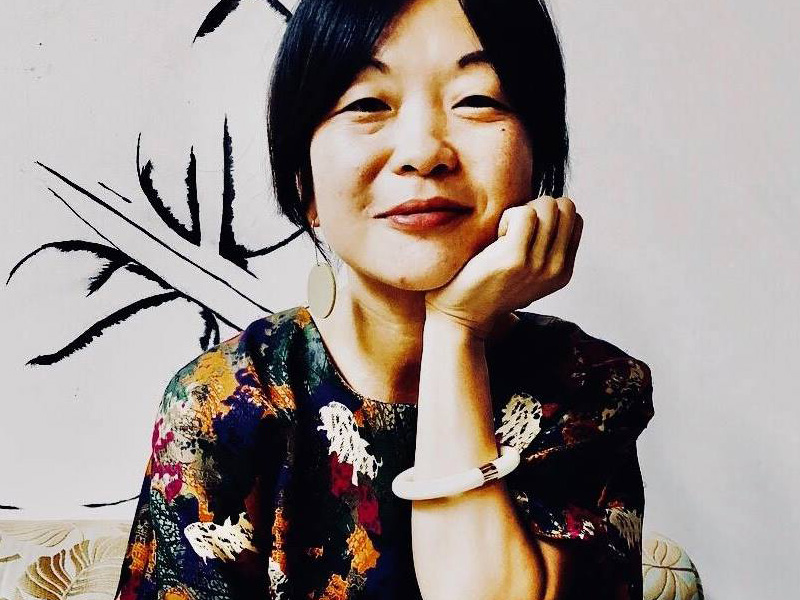 There are various facts we know related to mental health and stigma within the Asian American Pacific Islander (AAPI) community. According to the Centers for Disease Control, Asian Americans tend to be disproportionately impacted by mental health issues, but are less inclined to seek help for a multitude of reasons: in order to “save face”; because language barriers and the lack of culturally and linguistically responsive services effectively deny services to many first-generation AAPI residents; and due to ongoing social and cultural stigmas surrounding accessing mental health supports. Because of this, many young Asian Americans choose to keep their mental health issues within their family and/or seek religious advice, rather than professional help.
There are various facts we know related to mental health and stigma within the Asian American Pacific Islander (AAPI) community. According to the Centers for Disease Control, Asian Americans tend to be disproportionately impacted by mental health issues, but are less inclined to seek help for a multitude of reasons: in order to “save face”; because language barriers and the lack of culturally and linguistically responsive services effectively deny services to many first-generation AAPI residents; and due to ongoing social and cultural stigmas surrounding accessing mental health supports. Because of this, many young Asian Americans choose to keep their mental health issues within their family and/or seek religious advice, rather than professional help.
To explore the complex terrain of mental health issues impacting our diverse AAPI community, Richmond Area Multi-Services, Inc. (RAMS), a Bay Area mental health agency committed to providing community-based, culturally and linguistically responsive services, held an event called “Open in Emergency: A Discussion on Mental Health Issues in Our Communities” on March 31, 2018. The event, which took place at San Francisco’s Arc Gallery & Studios, was a collaborative endeavor with the Kearny Street Workshop and the Asian American Literary Review (AALR).
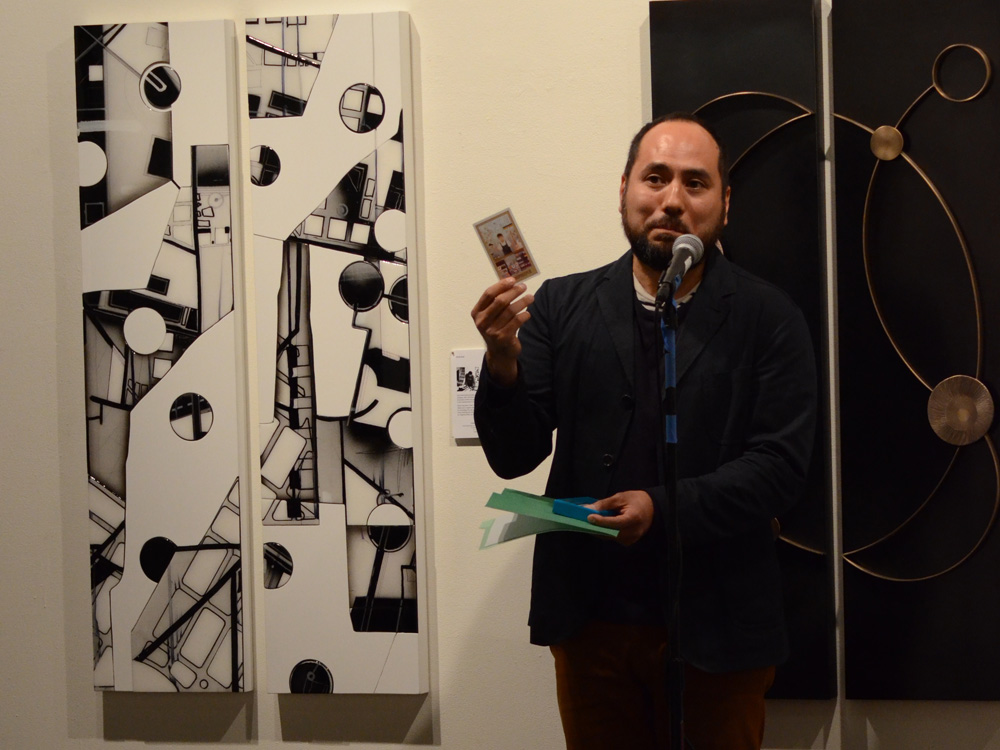 “Open in Emergency,” curated as a dynamic and interactive night market, integrated readings by P&W–supported poet Brandon Som and scholar Simi Kang, and interactive tables, which included tarot card readings using AALR’s beautiful Asian American Tarot deck and “Corner of Heart-to-Hearts” conversations catalyzed by cards created by Chad Shomura and illustrated by Yumi Sakugawa. This open space allowed the audience and contributors to interact in a way that was more relational and conversational. Audience members listened to the readings, but were also able to walk around the gallery and interact with the different stations.
“Open in Emergency,” curated as a dynamic and interactive night market, integrated readings by P&W–supported poet Brandon Som and scholar Simi Kang, and interactive tables, which included tarot card readings using AALR’s beautiful Asian American Tarot deck and “Corner of Heart-to-Hearts” conversations catalyzed by cards created by Chad Shomura and illustrated by Yumi Sakugawa. This open space allowed the audience and contributors to interact in a way that was more relational and conversational. Audience members listened to the readings, but were also able to walk around the gallery and interact with the different stations.
RAMS is grateful for the support from Poets & Writers, which provided funding for Brandon—who was also a contributor to the “Open In Emergency” issue released by AALR in January. For the evening, Brandon read a moving prose piece he created for “The Shopkeeper” profile card in the Asian American Tarot deck. The prose was loosely based on his own experience of growing up in a corner store and working there with his father and grandparents. He also read a poem called “Raspadas.” Of the event, Brandon said, “I was excited to contribute to the project, because I think it is important to underscore the mental health issues that arise due to experiencing and processing racism and racial trauma.”
RAMS hopes to continue this event each year, in order to raise awareness of mental health stigmas, provide resources and referrals, and bring together different communities, including clinicians, mental health workers, scholars, poets, artists, and a broader audience-at-large.
Support for this event and Readings & Workshops in California is provided by the California Arts Council, a state agency, and the National Endowment for the Arts, a federal agency. Additional support comes from the Friends of Poets & Writers.
Photos: (top) Cristiana Baik (Credit: Crystal Baik). (bottom) Brandon Som (Credit: Andrew Taw).





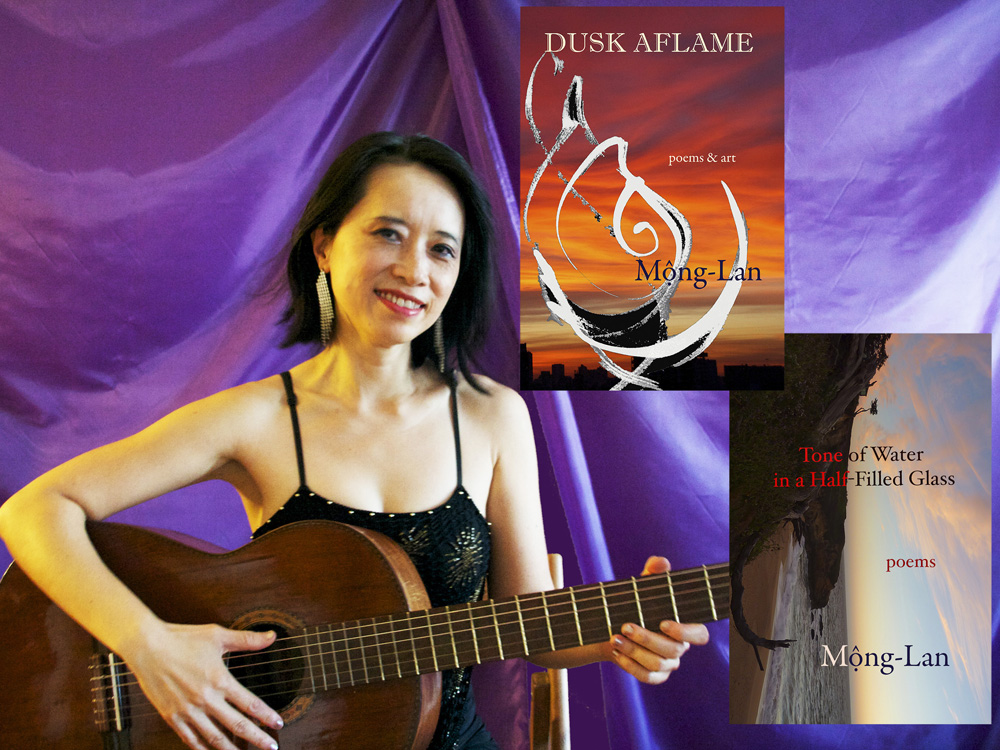 I’m grateful that Poets & Writers has cosponsored me for three events: The Poets in Play poetry reading at the Soup Full Café in Corning, New York; a poetry writing workshop a day later at the ARTS Council of the Southern Finger Lakes; and a convivial reading at Wheeler Hill hosted by poet Michael Czarnecki of FootHills Publishing, which published my most recent chapbook, Tone of Water in a Half-Filled Glass. Finally, I taught a workshop for the Watkins Glen Writers Group, and later gave a reading. Through the generosity of Poets & Writers, I was able to promote my seventh book, Dusk Aflame: poems & art, and new chapbook.
I’m grateful that Poets & Writers has cosponsored me for three events: The Poets in Play poetry reading at the Soup Full Café in Corning, New York; a poetry writing workshop a day later at the ARTS Council of the Southern Finger Lakes; and a convivial reading at Wheeler Hill hosted by poet Michael Czarnecki of FootHills Publishing, which published my most recent chapbook, Tone of Water in a Half-Filled Glass. Finally, I taught a workshop for the Watkins Glen Writers Group, and later gave a reading. Through the generosity of Poets & Writers, I was able to promote my seventh book, Dusk Aflame: poems & art, and new chapbook.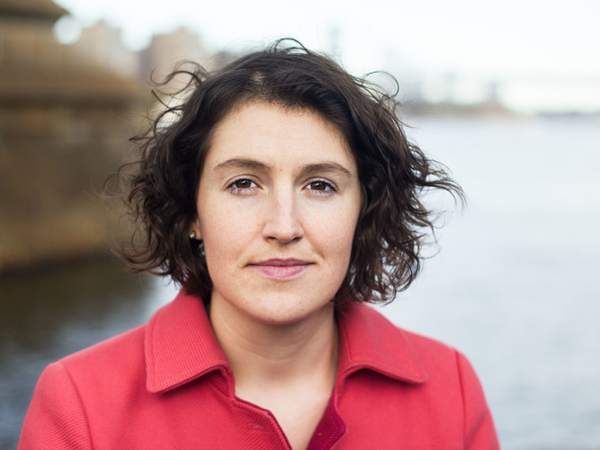 Office Hours Poetry Workshop emerged from the deep need for a program that supports and elevates post–MFA writers. The goal: to build a no-fee workshop that accommodates full-time work schedules, childcare needs, and celebrates writers who are POC, LGBTQ+, women-identified, adjunct instructors, and any and all combination. More than anything, I wanted to compensate our writers. The Poets & Writers’ Readings & Workshops grant became a profound way to do so.
Office Hours Poetry Workshop emerged from the deep need for a program that supports and elevates post–MFA writers. The goal: to build a no-fee workshop that accommodates full-time work schedules, childcare needs, and celebrates writers who are POC, LGBTQ+, women-identified, adjunct instructors, and any and all combination. More than anything, I wanted to compensate our writers. The Poets & Writers’ Readings & Workshops grant became a profound way to do so.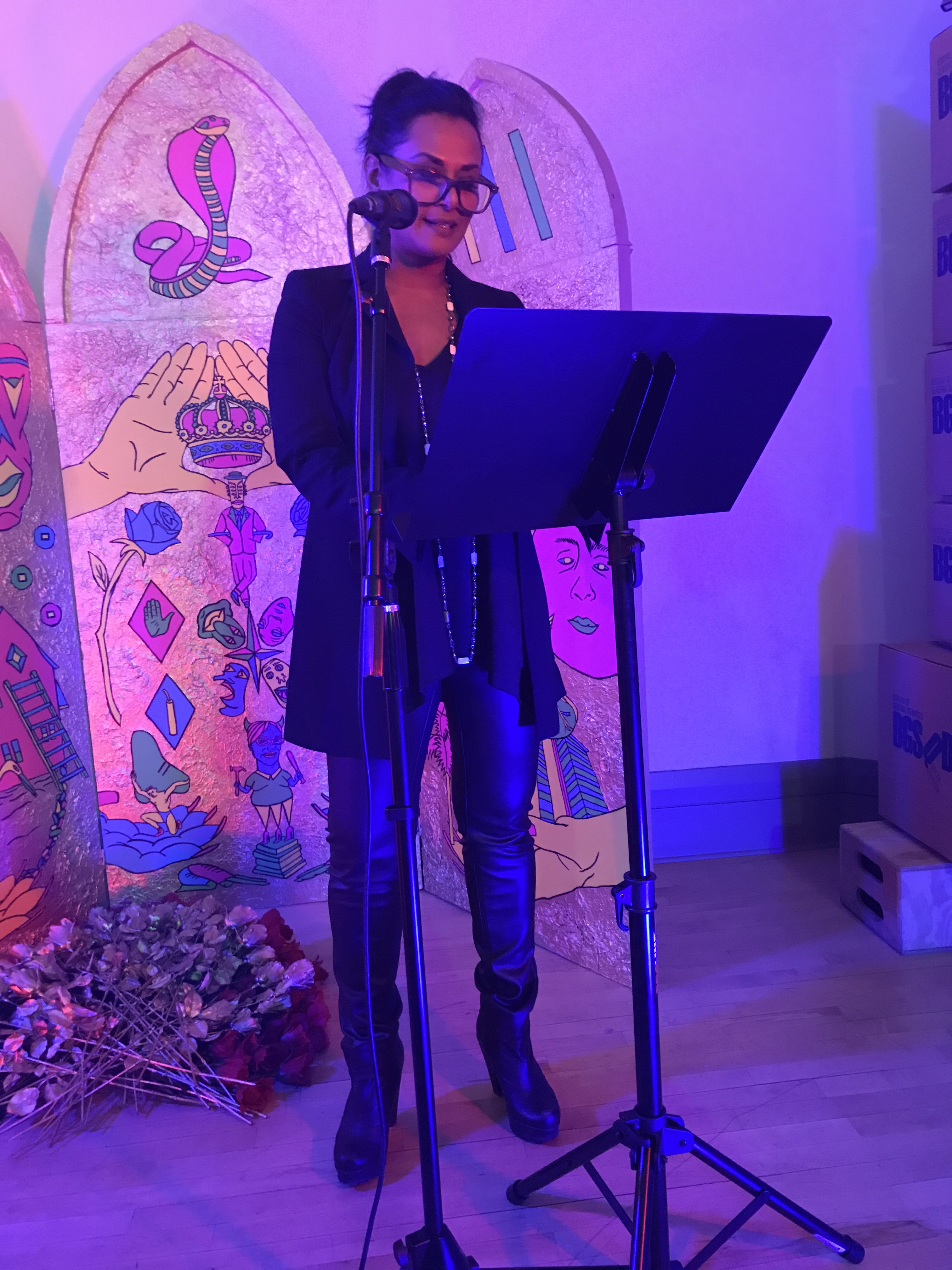 June Jordan said that poetry is a political act because it involves truth telling. Very often this means writing through a lens counter to mainstream culture, embodying our power and vulnerabilities on the page, and practicing radical empathy with fellow artists. For this reason, it was an immense pleasure to introduce the Office Hours Spring Showcase fellows at the Bureau of General Services–Queer Division (BGSQD).
June Jordan said that poetry is a political act because it involves truth telling. Very often this means writing through a lens counter to mainstream culture, embodying our power and vulnerabilities on the page, and practicing radical empathy with fellow artists. For this reason, it was an immense pleasure to introduce the Office Hours Spring Showcase fellows at the Bureau of General Services–Queer Division (BGSQD).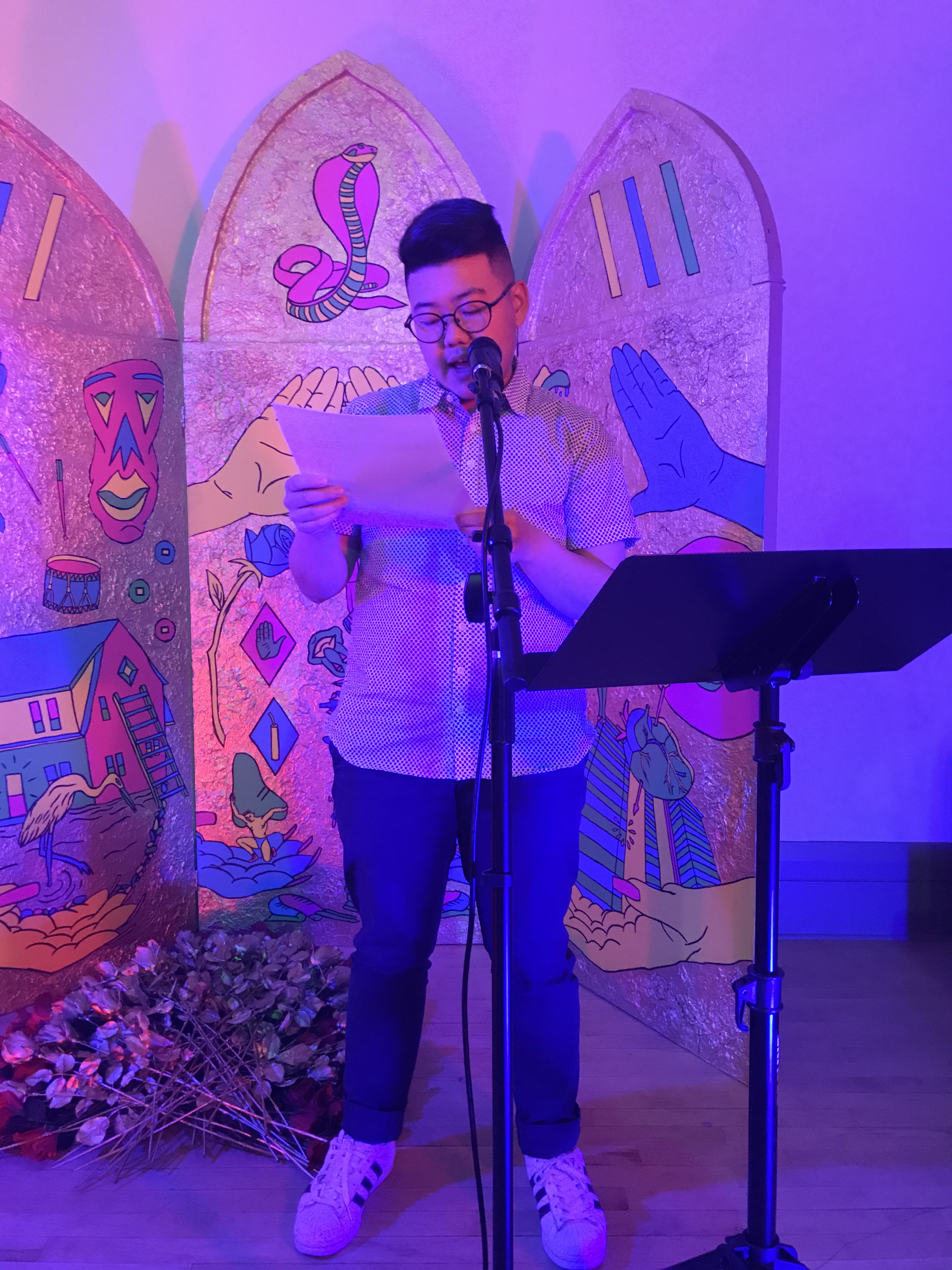 Next, Yanyi read his self-described “soft prose poems”—rich and particular renderings of the domestic. Caitlin McDonnell’s lyric narratives confronted the reality of gun violence in America and presented a tapestry of inventive first lines from novels she’s written and/or abandoned. Holly Mitchell’s lush writing strode between epithalamion and coming-of-age in a conservative landscape.
Next, Yanyi read his self-described “soft prose poems”—rich and particular renderings of the domestic. Caitlin McDonnell’s lyric narratives confronted the reality of gun violence in America and presented a tapestry of inventive first lines from novels she’s written and/or abandoned. Holly Mitchell’s lush writing strode between epithalamion and coming-of-age in a conservative landscape.